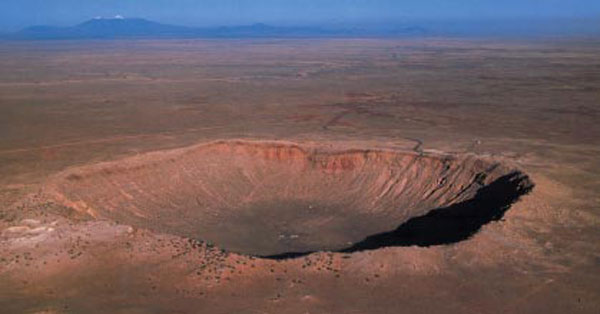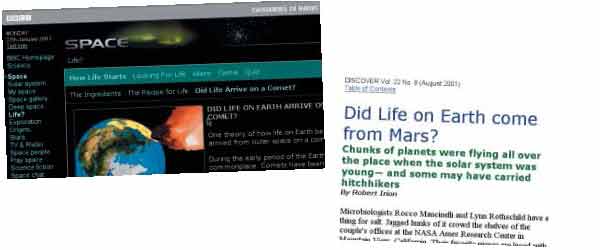It is not possible for meteors to carry a living organism to Earth because of the intense heat generated when they enter the atmosphere and the violence of impact when they land. Above: A large meteor crater in Arizona. Even if we accept there are living things in outer space, it is still impossible to account for their origins in any other way than through creation.
10. Could Life Have Come From Outer Space?
When Darwin put forward his theory in the middle of the nineteenth century, he never mentioned how the origin of life, in other words the first living cell, came to be. Scientists looking for the origin of life at the beginning of the twentieth century began to realise that the theory was invalid. The complex and perfect structure in life prepared the ground for many researchers to perceive the truth of creation. Mathematical calculations and scientific experiment and observation demonstrated that life could not be the "product of chance," as the theory of evolution claimed.
With the collapse of the claim that coincidence was responsible and the realisation that life was "planned," some scientists began to look for the origin of life in outer space. The best-known of the scientists who made such claims were Fred Hoyle and Chandra Wickramasinghe. These two cobbled together a scenario in which they proposed that there was a force which "seeded" life in space. According to the scenario, these seeds were carried through the emptiness of space by gas or dust clouds, or else by an asteroid, and eventually reached the Earth, and life thus started here.
Nobel Prize–winner Francis Crick, co-discoverer with James Watson of the double helix structure of DNA, is one of those who has sought the origin of life in outer space. Crick came to realise that it is quite unreasonable to expect life to have started by chance, but he has claimed instead that life on Earth was started by intelligent "extraterrestrial" powers.
As we have seen, the idea that life came from outer space has influenced prominent scientists. The matter is now even discussed in writings and debates on the origin of life. The idea of looking for the origin of life in outer space can be considered from two basic perspectives.
Scientific inconsistency
The key to evaluating the "life began in outer space" thesis lies in studying the meteorites that reached the Earth and the clouds of gas and dust existing in space. No evidence has yet been found to support the claim that celestial bodies contained non-earthly creatures that eventually seeded life on Earth. No research that has been carried out so far has revealed any of the complex macromolecules that appear in life forms.

Furthermore, the substances contained in meteorites do not possess a certain kind of asymmetry found in the macromolecules that constitute life. For instance, amino acids, which make up proteins, which are themselves the basic building blocks of life, should theoretically occur as both left- and right-handed forms ("optical isomers") in roughly equal numbers. However, only left-handed amino acids are found in proteins, whereas this asymmetric distribution does not occur among the small organic molecules (the carbon-based molecules found in living things) discovered in meteorites. The latter exist in both left- and right-handed forms.51
That is by no means the end of the obstacles to the thesis that bodies and substances in outer space gave rise to life on Earth. Those who maintain such an idea need to be able to explain why such a process is not happening now, because the Earth is still being bombarded by meteorites. However, study of these meteorites has not revealed any "seeding" to confirm the thesis in any way.
Another question confronting the defenders of the thesis is this: Even if it is accepted that life was formed by a consciousness in outer space, and that it somehow reached Earth, how did the millions of species on Earth come about? That is a huge dilemma for those who suggest that life began in space.
Alongside all of these obstacles, no trace has been found in the universe of a civilisation or life form that could have started life on Earth. No astronomical observations, which have picked up enormous speed in the last 30 years, have given any indication of the presence of such a civilisation.
 Hurriyet Newspaper, March 31, 2000 EVOLUTIONISTS' "EXTRATERRESTRIAL" DILEMMA Claims that the origin of life could lie in space, or even "extraterrestrials," are nothing more than science fiction. No concrete evidence can be supplied to back them up, and news and comments on the subject just consist of speculation that "it could have happened." In fact, these scenarios are quite impossible. Even if we assume that some organic compounds were carried to Earth by meteors, it is a chemical, physical, and mathematical fact that these compounds could not have given rise to life by themselves. The fantasy that life on Earth could have been created by "extraterrestrials" is a ploy by means of which evolutionists try to avoid admitting the existence of God, since life cannot be explained by chance. But this is totally meaningless, too, because the "extraterrestrial" thesis just takes the question one step back, and leads to the question: "Who created the extraterrestrials?" Reason and science lead us to an Absolute Being who created us and all living things, though He Himself was not created and has existed forever. That means God, the Creator of everything. |
|---|
What lies behind the "extraterrestrial" thesis?
As we have seen, the theory that life on Earth was begun by extraterrestrials has no scientific basis to it. No discoveries have been made to confirm or support it. However, when the scientists who put forward the suggestion began to look in that direction, they did so because they perceived one important truth.
The truth in question is that a theory that seeks to explain life on Earth as being the result of chance is no longer tenable. It has been realised that the complexity revealed in the life forms on Earth can only be the product of intelligent design. In fact, the areas of expertise of the scientists who sought the origin of life in outer space give a clue as to their rejection of the logic of the theory of evolution.
Both are world-renowned scientists: Fred Hoyle is an astronomer and bio-mathematician, and Francis Crick a molecular biologist.
THE SUPERSTITION EVOLUTIONISTS SO BLINDLY BELIEVE IN:
The above formula is the shortest way of expressing the theory of evolution. Evolutionists believe that inanimate and unconscious collections of atoms and molecules came together and organised themselves over time, finally becoming alive and turning into millions of exceedingly complex and perfect living species. This superstition is backed up by no known physical or chemical law. On the contrary, the laws of physics and chemistry show that time has a "disorganising, destructive" effect, not an "organising" one (the Second Law of Thermodynamics). Actually, the "time" factor is nothing but a deception used by evolutionists to take their theory out of the field of observation. Since no "evolutionary process" which creates new living things can be observed in nature, evolutionists try to gloss over this fact by saying: "Yes, evolution cannot be observed, but it may have taken place over the previous millions of years." This claim is also torn down by the fossil record, which shows that no evolutionary process ever happened.
|
|---|
One point which needs to be considered is that those scientists who look to outer space to find the origin of life do not actually make any new interpretation of the matter. Scientists such as Hoyle, Wickramasinghe, and Crick began to consider the possibility that life came from space because they realised that life could not have come about by chance. Since it was impossible for life on Earth to have begun by chance, they had to accept the existence of a source of intelligent design in outer space.
However, the theory put forward by them on the subject of the origin of this intelligent design is contradictory and meaningless. Modern physics and astronomy have revealed that our universe originated as a result of a huge explosion some 12-15 billion years ago known as "The Big Bang." All matter in the universe came about from that explosion. For this reason, any idea that seeks the origin of life on Earth in another matterbased life form in the universe has to explain in turn how that form of life came into existence. The meaning of this is that such a suggestion does not actually solve the problem, but takes it one step further back. (For more detail, see Harun Yahya's books The Creation of the Universe and Timelessness and The Reality of Fate).
As we have seen, the thesis that "life came from outer space" does not support evolution, but is a view that reveals the impossibility of evolution and accepts that there can be no other explanation for life than intelligent design. The scientists who suggested this began with a correct analysis but then went down a false road, and started the silly search for the origin of life in outer space.
It is obvious that the concept of "extraterrestrials" cannot account for the origin of life. Even if we accept for one moment the hypothesis that "extraterrestrials" actually exist, it is still clear that they could not have come into being by chance, but must themselves be the product of intelligent design. (That is because the laws of physics and chemistry are the same everywhere in the universe, and they make it impossible for life to emerge by chance.) This shows that God, Who is beyond matter and time, and possesses infinite might, wisdom, and knowledge, created the universe and everything in it.
Footnotes
51. Massimo Pigliucci, Rationalists of East Tennessee Book Club Discussion, October 1997
- Introduction
- 2. How does the collapse of the theory of evolution demonstrate the truth of creation?
- 1. Why ıs the theory of evolution not scientifically valid?
- 3. How far back do traces of man go? Why do these not support evolution?
- 4. Why ıs the theory of evolution ''not the basis of biology''?
- 5. Why is the existence of different races not evidence for evolution?
- 6. Why is the claim that human and ape genomes are 99 percent similar and that this confirms evolution not true?
- 7. Why is the claim that dinosaurs evolved ınto birds an unscientific myth?
- 8. What scientific forgery ıs the myth that ''human embryos have gills'' based on?
- 9. Why is ıt deceptive to portray cloning as ''evidence for evolution''?
- 10. Could life have come from outer space?
- 11. Why does the fact that the earth is four billion years old not support the theory of evolution?
- 12. Why are wisdom teeth not evidence of evolution?
- 13. How do the complex structures of the most ancient creatures demolish the theory of evolution?
- 14. Why is denying the theory of evolution portrayed as rejecting development and progress?
- 15. Why is ıt mistaken to think that God could have created living things by evolution?
- 16. Why is it wrong to think that evolution could be confirmed ın the future?
- 17. Why is metamorphosis not evidence of evolution?
- 18. Why is it impossible to account for dna by ''chance''?
- 19. Why is it that bacterial resistance to antibiotics is not an example of evolution?
- 20. What kind of relationship is there between creation and science?
